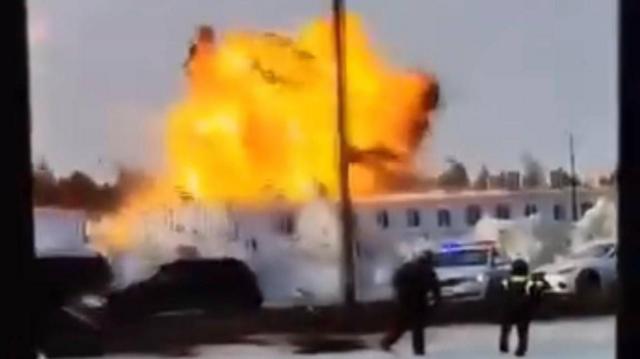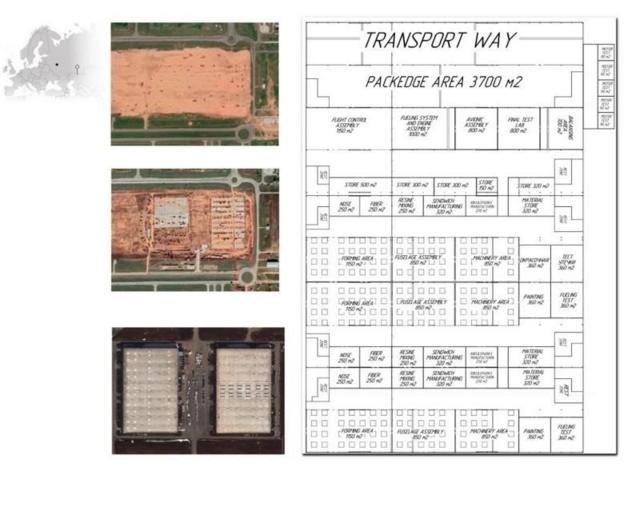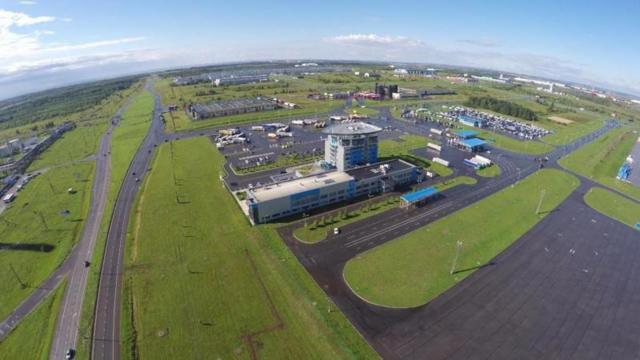Влада російського Татарстану заявила, що вранці у вівторок підприємства в Єлабузі та Нижньокамську зазнали атак безпілотників.
Вибухи лунали в особливій економічній зоні “Алабуга”, де розташовані підприємства за понад 1200 кілометрів від кордону з Україною.
В Єлабузі вдарили по заводу зі збирання безпілотників типу Shahed. У Нижньокамську дрон атакував нафтопереробний комплекс
Джерела ВВС в силових структурах підтвердили, що атаки на НПЗ в Татарстані – це спільна операція СБУ та ГУР.
Від початку року українські дрони неодноразово атакували нафтопереробні заводи в Росії, що, як повідомляли ЗМІ, призвело до скорочення випуску палива.
У російських телеграм-каналах з’явилося відео одного з ударів. На ньому видно, як дрон врізається в будівлю в Єлабузі, внаслідок чого стається вибух.
Як повідомив телеграм-канал ОЕЗ, о 5:45 ранку за місцевим часом два безпілотники нібито вдарили по гуртожитку.

АВТОР ФОТО,СКРІН/ТЕЛЕГРАМ Підпис до фото, Вибух в Єлабузі
Місцева влада твердить, що серйозних руйнувань на підприємствах немає. “Технологічний процес не порушений”, – йдеться в пресрелізі голови Татарстану.
За останніми даними, внаслідок атаки постраждали семеро людей, троє госпіталізовані.
Втім “РБК-Україна” з посиланням на джерело стверджує, що внаслідок удару є значні руйнування виробничих потужностей. Тако само на великі руйнування вказує і джерело ВВС Україна у силових органах.
Торік у серпні видання Washington Post повідомляло, що Росія хоче налагодити на заводі в Єлабузі велике виробництво дронів іранської моделі. Планували виробити 6 тисяч “Шахедів” до 2025 року.
У розслідуванні журналістів видання “Протокол” та YouTube-каналу “РЗВРТ” стверджувалося, що до збирання дронів-камікадзе на заводі в особливій економічній зоні нібито залучають, зокрема, студентів коледжу “Алабуга Політех”.

АВТОР ФОТО,THE WASHINGTON POST Підпис до фото, Так виглядає російський завод з виробництва “Шахедів” за даними The Washington Post
НПЗ у Нижньокамську
Також російські ЗМІ повідомляють, що безпілотник атакував нафтопереробний комплекс у Нижньокамську. Він входить до татарстанського нафтопереробного комплексу.
За словами співрозмовника агентства ТАСС, внаслідок атаки виникла пожежа, яку вдалося ліквідувати за 20 хвилин.
Телеграм-канал Baza пише, що постраждали три людини.
При цьому влада Нижньокамська стверджує, що система РЕБ перехопила безпілотник, який атакував НПЗ, а постраждалих і руйнувань немає.
За даними Reuters, дрон атакував встановлення первинної переробки нафти АВТ-7 на НПЗ “Танеко”, що належить “Татнафті”.
Джерела ВВС Україна в силових структурах підтвердили, що атаки на НПЗ в Татарстані – це спільна операція СБУ та ГУР.
“Український далекобійний дрон влучив в установку первинної переробки нафти на НПЗ в Нижньокамську, після чого там виникла пожежа. Потужність цієї установки складала 8 млн тонн нафти, а це – 2,6% від загальної річної переробки РФ на рік. Окрім того, цей завод входить в п’ятірку найбільших НПЗ Росії”.

АВТОР ФОТО,ALABUGA.RU Підпис до фото, Особливу економічну зону в Єлабузі відкрили у 2007 році
У березні почастішали атаки дронів на російські НПЗ, а також інші промислові об’єкти.
Однак це перший випадок, коли українські безпілотники долетіли до Татарстану – на відстань понад 1200 кілометрів.
Українські ЗМІ регулярно повідомляють про те, що ГУР стоїть за атаками дронів на російські промислові об’єкти. Офіційно Київ не заявляє про удари, але минулого тижня президент Володимир Зеленський в інтерв’ю Washington Post розповів про негативну реакцію влади США на такі атаки.
“Ми використовували наші безпілотники. Ніхто не може сказати нам, що ми не можемо”, — сказав Зеленський, пов’язуючи обстріли російських НПЗ з тим, що Україна не має засобів ППО, щоб захистити свою енергетичну інфраструктуру від російських ударів.
Напередодні міністр цифрової трансформації Михайло Федоров заявив німецькому виданню Welt, що Україна вже виробляє безпілотні літальні апарати, які здатні подолати понад тисячу кілометрів.
Він також зазначив, що Україна в десятки разів збільшила виробництво безпілотників дальньої дії порівняно з минулим роком.
“Більшість використовуваних дронів мають радіус дії від 700 до 1000 кілометрів. Але зараз є моделі, які можуть пролетіти понад 1000 кілометрів”, – пояснив Федоров.
На відео з Татарстану видно великі безпілотні літаки, яких раніше на кадрах ударів не було.
Атаки на російські НПЗ впливають на економіку Росії сильніше, ніж західні санкції – CNN
Як пише CNN з посиланням на кількох опитаних експертів, найчастіше українські дрони вражають не сховища палива, а перегонні установки, де сира нафта переробляється і перетворюється на паливо.
Експерти вважають, що ці атаки можуть вплинути на російську економіку більше, ніж нинішні санкції, йдеться в публікації CNN.
“Якщо задуматися про запроваджені санкції, то вони значною мірою оминали енергетику”, – пояснює Хеліма Крофт з інвестиційного банку RBC Capital Markets. “Насправді саме експорт енергоносіїв, сирої нафти, природного газу та продуктів нафтопереробки дав Росії економічне рятувальне коло для продовження цієї війни”.
Українські атаки по російських НПЗ вже призвели до зростання світових нафтових цін: цього року ціна на нафту Brent зросла майже на 13%.
Американських чиновників турбує наслідки на світову економіку від цих ударів, але “тупикова ситуація у Вашингтоні щодо фінансування України та можливість змін у Білому домі наступного року можуть дати Києву певну свободу дій”, йдеться у публікації.

